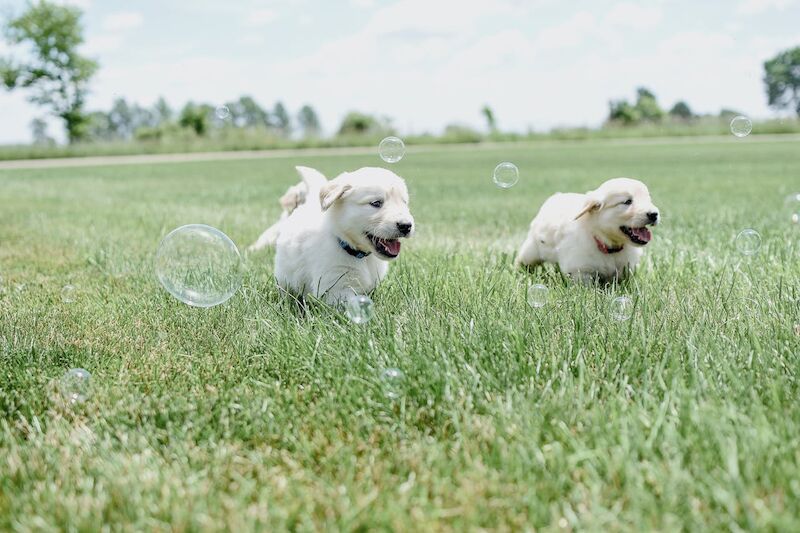
The Golden Retriever's intelligence and eagerness to please make them one of the most trainable dog breeds in the world. But their enthusiasm and sensitivity mean they need consistent, positive guidance to reach their full potential. This comprehensive guide explores how to train your Golden Retriever at every stage - from excitable puppy to calm, obedient adult.
If you haven't already, you might also enjoy our earlier article on Golden Retriever temperament, which explains the gentle and loyal nature that makes this breed such a joy to train.
Understanding the Golden Retriever Mindset
Golden Retrievers are naturally cooperative dogs. Bred for retrieving game alongside humans, they developed a strong instinct to listen, follow cues, and maintain focus - qualities that make them excellent working and family dogs today. According to The Kennel Club, the breed standard describes them as “obedient and intelligent, with a natural working ability.”
However, their intelligence can also lead to mischief if they aren't mentally stimulated. A bored Golden Retriever is quick to invent their own fun - whether that means digging, chewing, or stealing socks. The key is to channel their curiosity and energy into constructive activities.
Early Socialisation and Puppy Foundations
Training should start the moment your Golden Retriever puppy comes home - usually at around eight weeks old. Early experiences shape behaviour for life, so focus on calm, positive introductions to new people, places, and sounds.
- Start with name recognition: Reward your puppy whenever they respond to their name.
- Encourage gentle handling: Touch their paws, ears, and tail to get them used to grooming and vet visits.
- Introduce short training sessions: Keep them fun and under five minutes to match a puppy's attention span.
Golden Retrievers are food-motivated learners, so reward-based training (using treats or praise) works best. Avoid punishment or harsh tones - this breed is sensitive to human emotion and responds far better to encouragement and consistency.
Basic Training: Sit, Stay, and Recall
Once your Golden understands simple cues, you can build toward more structured obedience. Core commands such as sit, stay, come, and leave it form the foundation for safe, reliable behaviour.
Because Goldens naturally enjoy pleasing their owners, they quickly grasp these basics. Keep sessions short and varied to maintain enthusiasm. Remember to end each session positively - ideally with playtime, a walk, or a favourite toy.
Leash Training and Recall in the Real World
Golden Retrievers love outdoor adventure, but that excitement can lead to pulling on the lead or chasing distractions. Consistent leash training prevents this. Use a harness and reward calm walking beside you. If they pull, stop walking until they return to your side - patience pays off here.
Recall (coming when called) is another vital skill. Start in a secure, distraction-free area and use a cheerful tone. Gradually increase difficulty by practising around other dogs or in open fields. Always reward generously for returning promptly - Golden Retrievers thrive on positive association.
Mental Stimulation and Advanced Training
Golden Retrievers need to exercise both their bodies and minds. In addition to daily walks, provide activities that challenge their intelligence and problem-solving skills:
- Retrieving games: Use soft toys or tennis balls to engage their natural instincts.
- Puzzle feeders: These help slow down mealtime and keep your dog mentally engaged.
- Obedience classes: Structured group classes reinforce discipline and social skills.
- Canine sports: Goldens excel in agility, scent work, and flyball - perfect outlets for energy and focus.
Training an Adolescent or Rescue Golden Retriever
Adolescent Goldens (between 6–18 months) may temporarily “forget” their training as they test boundaries. This is normal - consistency is the cure. Reinforce earlier lessons and maintain calm authority. Avoid frustration; your patience will pay off as maturity returns.
For rescue or rehomed Golden Retrievers, start with trust-building. Use gentle routines, clear communication, and predictable structure. Their intelligence means they can adapt quickly once they feel secure.
Common Behavioural Challenges
Even well-trained Golden Retrievers can develop habits like jumping up, barking for attention, or pulling toward people. Most of these behaviours stem from over-enthusiasm rather than disobedience. Redirect energy with alternative cues - for example, teach “sit” for greetings or provide enrichment toys during downtime.
Remember, behaviour often reflects unmet needs. A Golden who's exercised, stimulated, and emotionally fulfilled is far less likely to develop unwanted behaviours.
Building a Lifelong Bond
Training is not just about obedience - it's about communication and trust. Golden Retrievers form deep emotional connections with their families, and consistent training strengthens that bond. When you teach through kindness and clarity, your dog will respond with loyalty, confidence, and affection.
Golden Retrievers are truly a joy to train. Their combination of intelligence, empathy, and enthusiasm makes them one of the most rewarding breeds for both new and experienced owners. By using positive methods and providing the right balance of exercise, mental stimulation, and affection, you'll raise a well-mannered companion for life.
Looking to bring a Golden Retriever into your family? Explore our latest Golden Retrievers for sale listings to find ethically bred puppies from trusted breeders.


